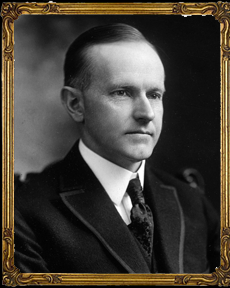
John Calvin Coolidge
Term Date: 1923-1929
Political Party: Republican
Vice President: Charles G. Dawes
Born Place: Plymouth, Vermont
Born Date: July 4, 1872
Died Place: Northampton, Massachusetts
Died Date: January 5, 1933
First Lady: Grace Anna Goodhue
Children: 2
Parents: John Calvin Coolidge, Victoria Josephine Moor
Other Political Offices:
Northampton, MA City Councilman, 1899
City Solicitor, 1900-1901
Clerk of Courts, 1904
Massachusetts Legislature, 1907-1908 and 1912-1915
Mayor of Northampton, MA, 1910-1911
Lieutenant-Governor of Massachusetts, 1916-1918
Governor of Massachusetts, 1919-1920
Vice President, 1921-1923 (under Warren Harding)
Occupation before elected:
Lawyer
Brief History:
He was born in 1872 and named John Calvin Coolidge. When he was governor labor differences were solved by promoting reasonable pay increases, and to give more power to municipalities. Coolidge knew how to ask people for advice and help when it was necessary. Upon hearing that he became president after the death of Warren Harding in 1923, Coolidge was sworn in by his father, a notary, and promptly went back to bed. His determination and knowledge of politics came from his father who was also an accomplished in public service. Coolidge was well liked in office by many, and held press conferences speaking on the radio, and posing for portraits dressed , cowboy hats and chaps, and full Indian headdresses. He inherited the scandals of Harding's presidency, and spent a lot of his time defending his party. He gained popularity with the voters by prosecuting offenders of those scandals, and because of that people once again had a high regard and confidence in the White House. Coolidge was also in favor of American membership on the World Court.
Coolidge was also responsible for renewing diplomatic relations with Mexico. He did not want to use Federal power to check the growing boom or change the condition of agriculture and certain industries. Among the policies that he supported were an isolation in foreign policy, for tax cuts, and limited aid to farmers. Coolidge was moderately successful in achieving his goals during his presidency. A few of his accomplishments were to combine the national debt and reduce income taxes, to make sure that more money was on hand for consumer spending. Other policies included the expansion of civil and military aviation, and to regulate radio broadcasting, a better flood control, and to help the farmers. Coolidge did not want to run for reelection and retired in 1929 to spend more time writing newspaper and magazine articles. He had very little interest in politics. He was not in good health, and on Jan. 5, 1933, he died of coronary thrombosis.
Coolidge was also responsible for renewing diplomatic relations with Mexico. He did not want to use Federal power to check the growing boom or change the condition of agriculture and certain industries. Among the policies that he supported were an isolation in foreign policy, for tax cuts, and limited aid to farmers. Coolidge was moderately successful in achieving his goals during his presidency. A few of his accomplishments were to combine the national debt and reduce income taxes, to make sure that more money was on hand for consumer spending. Other policies included the expansion of civil and military aviation, and to regulate radio broadcasting, a better flood control, and to help the farmers. Coolidge did not want to run for reelection and retired in 1929 to spend more time writing newspaper and magazine articles. He had very little interest in politics. He was not in good health, and on Jan. 5, 1933, he died of coronary thrombosis.

